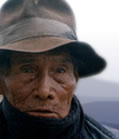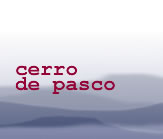THEMES IN THIS
TESTIMONY
Community Activities

Culture and Customs

Education

Employment and Income

Environment

Festivals

Health

Identity

Justice and crime

Land

Livestock

Migration

Social Change

Traditional Skills

Click on arrows
to find more
testimonies
featuring
these themes
|
|
Sex
|
female
|
|
|
Age
|
59
|
|
|
Occupation
|
campesina
|
|
|
Location
|
La Oroya
|
|
|
Date
|
1995
|
|
summary
Adela has lived as a comunero (registered community member with rights and responsibilities) in La Oroya all her life. In this rich and detailed interview she speaks powerfully of the changes she has seen in the area, drawing from her own experiences, as well as the anecdotes and memories passed down to her from her grandparents.
Throughout she emphasises the negative effects the company has brought to the region and asserts the community’s right to protest. She contrasts the horribly polluted landscape with the beauty and fertility of the land in the past. Comuneros have been ‘evicted’ from their land, and had to move further up into the mountains to find grazing land. She feels nothing but disgust for the company and all involved with them. She uses harsh language, accusing them of ‘plundering’, corruption and having their lawyer killed in a mysterious ‘accident’. She is proud of fact that ‘none of my children work for that company. We don’t owe anything to that company. Neither myself nor my family have made a living from that company’. She distinguishes between the different reactions of local people to the company. Some become corrupt and “sell out for a handful of money”. Some drink away their compensation and are left with nothing. Some, including her grandparents and her father, struggle against the company. Along with other community groups they took Cerro de Pasco to court, eventually winning after a trial lasting 25 years.
In one of the most poignant moments of the interview, Adela describes changes in the attitude of young people towards their parents. Many young people, including her own four children, move away due to lack of employment opportunities. She hardly ever sees her children or grandchildren and expresses both sadness at the lack of solidarity and also some resentment. Adela vividly describes various fiestas (festivals, celebrations) and the cultural life of her community. However, people moving away means some traditions weaken.
Although Adela is uncertain about particular dates and timings, the interview benefits from her wide experience and her willingness to talk passionately about her experiences. Throughout the interview she demonstrates her fighting spirit and determination not to give in to the company’s all-pervasive power or threats, while acknowledging great anger and sadness at the changes wrought on her community by the company. “This used to just be the campesino community of San Geronomio of La Oroya but now it’s different”. Working the land is no longer important to people - or possible.
detailed breakdown
|
You will need a password from Panos to view the full
transcript of the interview. To apply for a password, click here.
Once you have a password, click here to go to the beginning
of the transcript. You can also click on any section of the
breakdown of content below and go straight to the
corresponding part of the transcript.
|
| Section 1 |
Describes changes to La Oroya, from memories passed down from her grandparents. Pollution to grasslands and rivers, animals dying. Everyone had their own land which was sold, to build the La Oroya smelter. Corruption: ‘sold out for a handful of money’. Community sued Cerro de Pasco corporation.
She highlights the difficulties for a poor community in taking on a large and powerful company - it took years.
|
| Section 1-2 |
Their lawyer died in an ‘accident’; they believe he was killed by the company. |
| Section 2 |
Her memories of ‘old’ La Oroya, beautiful and verdant. Expresses sadness in seeing her land being destroyed. Anger because company didn’t let people of La Oroya work on their land: ‘everything was for mining’. People migrated to other villages or moved further up into the hills to find room to graze their animals.
|
| Section 3 |
Adela’s grandfather told her that when the smelter started operating, people stayed indoors for fear of harmful pollution. Her grandparents forced to buy land further away, in an ‘annex’. Some stayed to defend the land by suing the company. Others were bought out, drank away all their compensation and were left with nothing. Thus the company ‘began to appropriate the land’. Several other communities in the region took the company to court as well. “Because we had to gain respect, because they saw that we were poor, they thought they could do whatever they liked in our land.” Her grandparents and father involved in these struggles and refused to sell their land and “wouldn’t allow themselves to be evicted”.
|
| Section 4 |
Divided loyalties within the community, between those who sold their land and those who fought the company. Adela has stayed in La Oroya all her life, married for 40 years. Describes her married life as ‘sad’, gradually trying to improve their standard of living and struggling against the council to maintain their rights to community land. Company evicted many comuneros and pushed them into the hills.
|
| Section 5 |
Council loyalties were to the company, not the community: “The company had the money to pay. The Mayor didn’t care if the city was polluted.’”
Describes growth of La Oroya; some think it’s better now because it’s expanded. She sees the company as owning and controlling everything, expelling the original community. It is virtually impossible to remain as a comuneros. Her father and grandparents have always been comuneros, livestock herding, seasonal work.
|
| Section 6 |
Talks of changes in younger generation’s attitude: “we children would help our parents a lot then, not like now’” Younger generation losing respect: “they forget their parents”. She has four children; they have all moved away and she rarely sees them or her grandchildren. Left because of lack of work.
|
| Section 7 |
Family forced to separate, parents left alone. Becoming a common phenomenon. Regret and sadness at lack of family cohesion. Poignant pause in interview at this point; source of much sadness for Adela.
|
| Section 8 |
Talk of fiestas: some Spanish influence. Culture of area, dancing competitions.
Changes to fiestas over time. Describes branding fiesta, marking of new cattle and decorating with community ‘name’.
|
| Section 9 |
Less cattle now so less of a huge fiesta but they continue with the tradition. “It’s a very old fiesta that hasn’t died.” Suggests that company is suspicious of local fiestas; fear of protest and rebellion. Tried to prohibit gatherings but they carry on anyway. Re-asserts that they have good reason to protest.
|
| Section 10 |
Again emphasises the pollution and damage to her land. Discusses court cases, but Adela shows little faith that they can bring justice. Admits her husband worked for the company for 5 years. Her grandparents didn’t want him to work there, because of the danger, health hazards and pollution. Wisdom of older generation in discerning the dangers, not being seduced by the company, and retaining benefits of traditional way of life.
|
| Section 11 |
Describes herbal medicines for her husband’s illnesses caused by the factory
|
| Section 12 |
Husband was community treasurer in La Oroya. Describes their simple lifestyle.
Drinking water from a clear spring. ‘Centromin hasn’t got there and it hasn’t contaminated it like so many other lakes and rivers that they’ve contaminated around here. Those waters are very clean because they are from the snow-capped mountains.’
|
| Section 13 |
Has not washed clothes in Mantaro river for 30 years: “clothes came out dirty, dirtier than when you take them to be washed”. Story surrounding the origins of the name La Oroya.
|
| Section 14-15 |
Importance of passing on stories through generations. Fiesta of the bull commemorates the story. Losing traditions as people move out of the community. Explains that ‘annexes’ are nearby pieces of land incorporated into the community.
The community spent its compensation money from Cerro de Pasco to buy land together, and all pitched in their share.
Adela was born in an annex close to La Oroya. Here they can maintain their agricultural way of life. “It’s not really big enough as there are quite a lot of us comunero.” Changes to La Oroya: “before it was much more peaceful. Now everyone wants to do the same thing, they want to trade, be traders or miners to work for Centromin.”. Pride that her family were never involved with the company. Sadness and regret at changes. “We are communeros and that’s the way we have brought up our children.... but now it is different.” |
|


